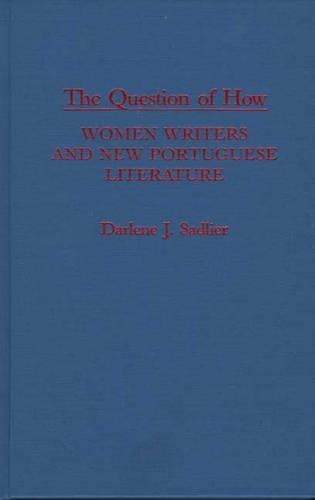
The Question of How: Women Writers and New Portuguese Literature
(Hardback)
Publishing Details
The Question of How: Women Writers and New Portuguese Literature
By (Author) Darlene J. Sadlier
Bloomsbury Publishing PLC
Praeger Publishers Inc
9th November 1989
United States
Classifications
Tertiary Education
Non Fiction
Literary studies: c 1900 to c 2000
869.342099287
Physical Properties
Hardback
157
Description
Contemporary Portugal offers a mixture of social revolution, literary experiment and feminist practice. Since the revolution in 1974, the country has produced a large number of writings by and about women. In fact, for the first time in Portuguese history, there are at least as many women as men writing books. This book presents an analysis of texts by the "Three Marias", Feranda Botelho, Lidia Jorge, Helia Correia and Teolinda Gersao. It investigates what Portuguese literary women have to say about their culture. In addition to showing how specific works of fiction are inflected by gender and ideology, Sadlier also presents a brief historical account of feminism in Portugal.
Reviews
Sadlier's study of women writers in Portugal after the 1974 revolution is a useful contribution to a neglected European literature, in which women are making a forceful contribution; and it is one of the few sources of such information in English. Sadlier deals with a conjuncture of social revolution, literary experiment, and feminist practice' in exemplary readings of authors who are connected by their common preoccupation with how to write' with authentic textual voices. Works analyzed include the famous Novas Cartas Portuguesas (Lisbon, 1972) by Maria Isabel Barreno, Maria Teresa Horta, and Maria Velho da Costa, Xerazade e os outros (Lisbon, 1964) by Fernanda Botelho, Lidia Jorge's O Dia dos Prodigios (2nd ed., 1980), Haelia Correia's Montedemo (Lisbon, 1983), and Teolinda Gersao's O Silencio (1981). These studies are followed by an appendix on the background of women's rights and feminism in Portugal. Although Sadlier has chosen these works because of their common tradition of literary modernism and aesthetic experimentation, her readings are descriptive rather than theoretical and provide an excellent introduction to representative works and themes of major contemporary women writers. . . . Sadlier's study is an intelligent, readable, informative introduction to Portuguese fiction by important contemporary women writers.-Choice
"Sadlier's study of women writers in Portugal after the 1974 revolution is a useful contribution to a neglected European literature, in which women are making a forceful contribution; and it is one of the few sources of such information in English. Sadlier deals with a conjuncture of social revolution, literary experiment, and feminist practice' in exemplary readings of authors who are connected by their common preoccupation with how to write' with authentic textual voices. Works analyzed include the famous Novas Cartas Portuguesas (Lisbon, 1972) by Maria Isabel Barreno, Maria Teresa Horta, and Maria Velho da Costa, Xerazade e os outros (Lisbon, 1964) by Fernanda Botelho, Lidia Jorge's O Dia dos Prodigios (2nd ed., 1980), Haelia Correia's Montedemo (Lisbon, 1983), and Teolinda Gersao's O Silencio (1981). These studies are followed by an appendix on the background of women's rights and feminism in Portugal. Although Sadlier has chosen these works because of their common tradition of literary modernism and aesthetic experimentation, her readings are descriptive rather than theoretical and provide an excellent introduction to representative works and themes of major contemporary women writers. . . . Sadlier's study is an intelligent, readable, informative introduction to Portuguese fiction by important contemporary women writers."-Choice
Author Bio
DARLENE J. SADLIER is Associate Professor of Spanish and Portuguese and Adjunct Associate Professor of Women's Studies at Indiana University. She is the author of two books published in Madrid and Brazil: Imagery and Theme in the Poetry of Cecilia Meireles: A Study of 'Mar Absoluto' and Cecilia Meireles e Joao Alphonsus.
